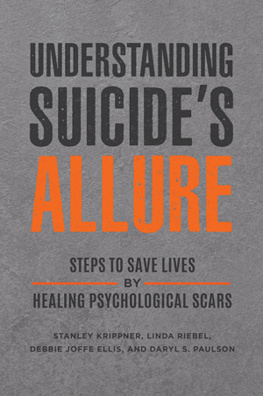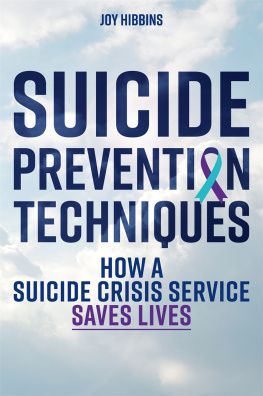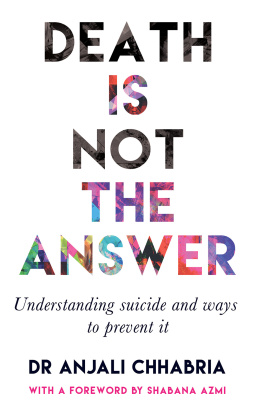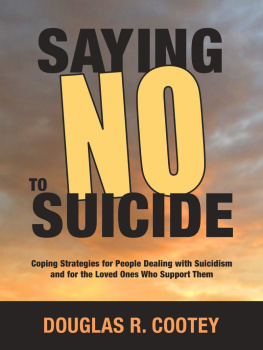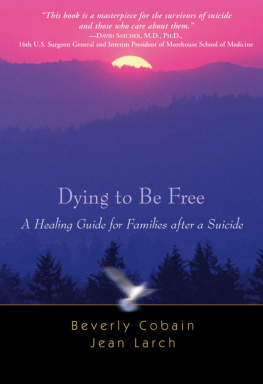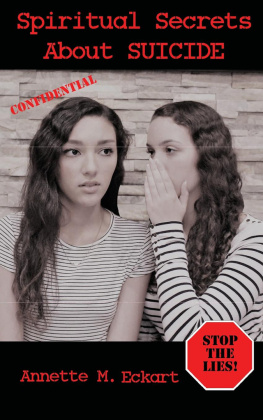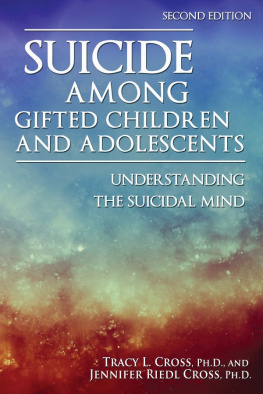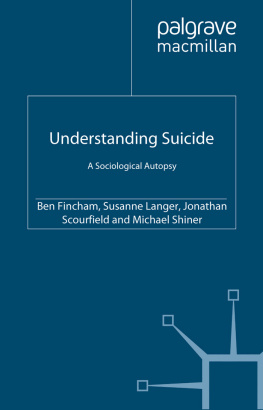Understanding Suicides Allure
Copyright 2021 by Stanley Krippner, Linda Riebel, Debbie Joffe Ellis, and Daryl S. Paulson
All rights reserved. No part of this publication may be reproduced, stored in a retrieval system, or transmitted, in any form or by any means, electronic, mechanical, photocopying, recording, or otherwise, except for the inclusion of brief quotations in a review, without prior permission in writing from the publisher.
Library of Congress Cataloging-in-Publication Data
Names: Krippner, Stanley, 1932- author. | Riebel, Linda, author. | Joffe-Ellis, Debbie, 1956- author. | Paulson, Daryl S., 1947- author.
Title: Understanding suicides allure : steps to save lives by healing psychological scars / Stanley Krippner, Linda Riebel, Debbie Joffe Ellis, and Daryl S. Paulson ; foreword by Harris L. Friedman, PhD.
Description: Santa Barbara : ABC-CLIO, 2021. | Includes bibliographical references and index.
Identifiers: LCCN 2020031231 (print) | LCCN 2020031232 (ebook) | ISBN 9781440862540 (hardcover) | ISBN 9781440862557 (ebook)
Subjects: LCSH: SuicidePsychological aspects. | Suicidal behavior. | Suicidal behaviorPrevention.
Classification: LCC HV6545 .K675 2021 (print) | LCC HV6545 (ebook) | DDC 616.85/8445dc23
LC record available at https://lccn.loc.gov/2020031231
LC ebook record available at https://lccn.loc.gov/2020031232
ISBN: 978-1-4408-6254-0 (print)
978-1-4408-6255-7 (ebook)
25 24 23 22 211 2 3 4 5
This book is also available as an eBook.
Praeger
An Imprint of ABC-CLIO, LLC
ABC-CLIO, LLC
147 Castilian Drive
Santa Barbara, California 93117
www.abc-clio.com
This book is printed on acid-free paper 
Manufactured in the United States of America
This book discusses treatments (including types of medication and mental health therapies), diagnostic tests for various symptoms and mental health disorders, and organizations. The authors have made every effort to present accurate and up-to-date information. However, the information in this book is not intended to recommend or endorse particular treatments or organizations, or substitute for the care or medical advice of a qualified health professional, or used to alter any medical therapy without a medical doctors advice. Specific situations may require specific therapeutic approaches not included in this book. For those reasons, we recommend that readers follow the advice of qualified health care professionals directly involved in their care. Readers who suspect they may have specific medical problems should consult a physician about any suggestions made in this book.
Contents
Suicide appears to be increasingly common in the United States, where suicide rates have hit their highest peak since World War II, Within some historical and cultural contexts, suicide can be seen as a noble actas in the traditional Japanese practice of seppuku, in which disgraced individuals disemboweled themselves as an act of restoring their lost honorbut these days it is rarely viewed favorably.
Yet, suicide has its allure within the contemporary West, which has been reflected in the title of this book. It raises many perplexing questions about lifes meaning and how one should live. In fact, suicide could be seen as the primal human dilemma, as all of us face a world replete with unavoidable suffering as well as fleeting pleasure. As philosopher Albert Camus famously stated, There is but one truly serious philosophical problem, and that is suicide. To Camus, facing this question is necessary for confronting questions about meaning and purpose.
As a clinical psychologist, I occasionally encountered suicidal clients in outpatient settings and routine hospital consultations but later became fascinated by this area, so I consulted with a Crisis Stabilization Unit at a community mental health center, where most people being initially seen were actively suicidal, arriving with rope burns on their necks or bandaged wrists. Still later, I consulted with several prisons, where one of my main roles was to decide whether inmates placed on suicide watch were actually suicidal or just trying to game the system to get better housing.
For those who hold on to a heroic version of life, such as dedicating themselves to wars against cancer, social and environment injustices, and even war itself, the fundamental assumption is that life is precious and suicide an ungrateful squandering of its opportunities. It seems easier to excuse suicide in dire circumstances, such as intractable suffering during terminal illness. However, I hazard that most Westerners see suicide as a failure rather than as a proclamation of ones freedom to live (or not to live) on ones own terms.
As the authors of this book have shown, there are many psychological theories and some solid research about what causes and what might prevent suicide. Even so, this ultimate act remains elusive, especially for those left behind. This can be especially painful when young and healthy people with a life apparently full of promise decide to end their existence.
This book is not an academic tome dryly examining scientific theories and data. In fact, the authors of this book are not suicidologists; they were curious about the epidemic of suicide in recent years. So it is a book about exploring a complicated topic, looking at a multiplicity of ideas from many perspectives, including the spiritual and transpersonal. Some chapters are practical, such as demonstrating how mental health practitioners use certain therapeutic approaches. Others are more abstract and scholarly. But all are thought-provoking and challenging. Rich case studies are given of people who have ended their own lives and of others who considered doing so, but who survived their dark nights of the soul.
For anyone who is struggling with suicidal thoughts, or who knows someone who is, or who is dealing with the aftermath of a loved ones suicide, this book can be a source of insight and inspiration. Camus concluded, In the end, one needs more courage to live than to kill himself. It is hoped that this book can help instill such courage for those during their own moments of truth.
Harris L. Friedman, PhD
Visiting Scholar, History of Science, Harvard University
Research Professor of Psychology, University of Florida
Clinical Psychologist in Private Practice
Notes
.
.
.
The authors of this book would like to acknowledge the financial support of Drs. Robert and Zohara Hieronimus, Richard and Connie Adams, and the AUM Center in Maryland, offering educational opportunities pertaining to religious metaphysics, occult sciences, and the mystical arts since 1969. Rosemary Coffey and Steve Hart provided editorial support, and Alanna Bova, Pamela Hansen, and Steve Speer supplied valuable resource material.
There are so many factors in developing, treating, and recovering from the risk of suicide that we found we have written over fifty chapters! We gave each major topic its own section, with numerous chapters in each. It is not necessary to read the whole book at once. There are sections you may find most relevant at a particular time and others that can be read as time permits. If you are a health care professional, this book covers a wide range of at-risk populations, theories, and treatments, and perhaps some of them are approaches you may not have been familiar with before.
In trying to explain the reasons that people take their lives, we have listed many defeatist attitudes and emotions, challenging conditions, and life circumstances. Our intention has been to put things into realistic perspective and, by describing the many treatments now available, to provide hope and encouragement. We have included information about some indigenous and other non-Western societies, though there is room in this book for only a small sample of these, but perhaps it is enough to help our readers look beyond Western problems.

